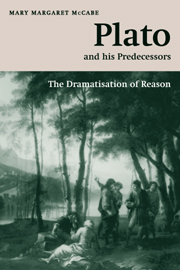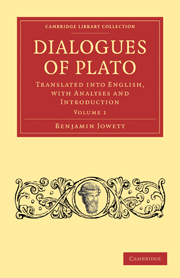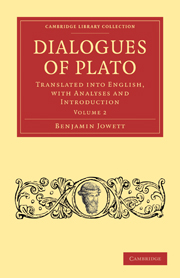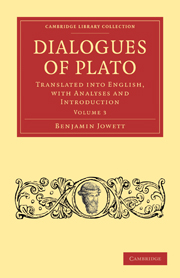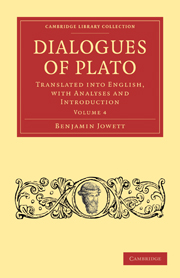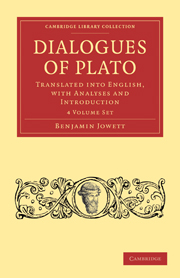Plato and his Predecessors
The Dramatisation of Reason
Part of The W. B. Stanford Memorial Lectures
- Author: Mary Margaret McCabe, King's College London
- Date Published: March 2007
- availability: Available
- format: Paperback
- isbn: 9780521033794
Paperback
Other available formats:
Hardback, eBook
Looking for an inspection copy?
This title is not currently available on inspection
-
How does Plato view his philosophical antecedents? Plato and his Predecessors considers how Plato represents his philosophical predecessors in a late quartet of dialogues: the Theaetetus, the Sophist, the Politicus and the Philebus. Why is it that the sophist Protagoras, or the monist Parmenides, or the advocate of flux, Heraclitus, are so important in these dialogues? And why are they represented as such shadowy figures, barely present at their own refutations? The explanation, the author argues, is a complex one involving both the reflective relation between Plato's dramatic technique and his philosophical purposes, and the very nature of his late philosophical views. For in these encounters with his predecessors we see Plato develop a new account of the principles of reason, against those who would deny them, and forge a fresh view of the best life - the life of the philosopher.
Read more- Examines how the philosophical and the literary are connected in Plato's late dialogues
- Sheds light on the philosophy of the late dialogues
- Looks at Plato's later conception of the life of the philosopher
Reviews & endorsements
'… wonderfully rich book …' Stephen Makin, The Times Literary Supplement
See more reviews'McCabe proves herself once again to be at the forefront in working out a new hermeneutic method within the analytical tradition of Platonic interpretation.' Hermathena
'This is a rich and complex book, addressing a series of interlocking issues in four of Plato's later dialogues … Scholars will find plenty to get their teeth into. McCabe supports her theses by a combination of close analysis of texts and sweeping argumentation. At both levels there are occasional moments of hesitation, but there is no doubt that she has opened up a rich new approach to the later dialogues. And the complexity of the work is nicely offset by a pleasing writing style.' The Heythrop Journal
'… a splendid book, sometimes difficult, never dull, attractively written, a triumph of philosophical scholarship and philosophical imagination. No student of the later Plato can afford - or could wish - to neglect it.' International Journal of Philosophy
Customer reviews
Not yet reviewed
Be the first to review
Review was not posted due to profanity
×Product details
- Date Published: March 2007
- format: Paperback
- isbn: 9780521033794
- length: 328 pages
- dimensions: 228 x 150 x 20 mm
- weight: 0.492kg
- availability: Available
Table of Contents
Preface
1. Introduction
Part I. The Opponents:
2. Measuring sincerity
3. Missing persons
4. Can the Heraclitean live his Heracliteanism?
Part II. Teleology:
5. Myth and its end
6. Outwitting the cunning man
Part III. Reason and the Philosopher:
7. Tracking down the philosopher
8. The sufficiency of reason
9. Meeting Socrates' challenge
Bibliography
General index
Index locorum.
Sorry, this resource is locked
Please register or sign in to request access. If you are having problems accessing these resources please email [email protected]
Register Sign in» Proceed
You are now leaving the Cambridge University Press website. Your eBook purchase and download will be completed by our partner www.ebooks.com. Please see the permission section of the www.ebooks.com catalogue page for details of the print & copy limits on our eBooks.
Continue ×Are you sure you want to delete your account?
This cannot be undone.
Thank you for your feedback which will help us improve our service.
If you requested a response, we will make sure to get back to you shortly.
×
